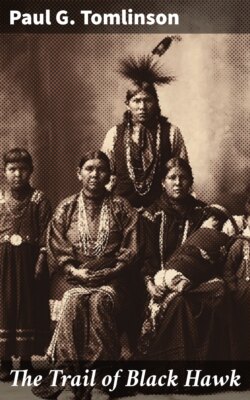Читать книгу The Trail of Black Hawk - Paul G. Tomlinson - Страница 3
На сайте Литреса книга снята с продажи.
PREFACE
ОглавлениеTable of Contents
The adventures and experiences of the hardy settlers on the continually advancing frontier have provided a fascinating but comparatively unknown chapter in the history of our country. Romance, bitter prejudice, distorted tales, and traditions more or less trustworthy, have combined to create a strong interest in the Indians. So much, however, has been written of a sensational and improbable nature that the result has not always been desirable. Just as there were “good” Indians and “bad” Indians, so the stories of Indians have ofttimes created impressions that were erroneous or even false.
The appeal of Indian life and of Indian wars, however, is perpetually strong. Who these early inhabitants of America were, what they did, how they lived and how they fought their battles, why they were engaged in conflicts with the early settlers and our troops, are essential parts of our history. The names of King Philip, Massasoit, Brandt, Tecumseh, Pontiac, Red Jacket, Black Hawk, Keokuk, Ouray, Sitting Bull and others are perhaps well known, but just what is behind the names is not so commonly understood.
And yet all this is a legitimate part of our history, which every American, and particularly every young American ought to know and wants to know. Even if it is impossible for him properly to understand the vanishing race he ought not to be ignorant of, nor forget, the struggle of those early days.
Black Hawk’s War occurred in 1832. Against the encroachments of the whites and their undeniable injustice, the Indians opposed their own methods of making war. The extermination of families, the lack of mercy, even the blood-thirstiness of the redmen were among their customary methods of making war and were universally recognized as such by their enemies of their own color. Black Hawk assuredly was a patriot, courageously fighting the battles of his own people. This story is an attempt to follow facts and events of that struggle as they occurred.
The author has followed the suggestions of many librarians and teachers and has cast his narrative into the form of a story. In the main part the story is true and the aim of its writer has been to present a picture of the struggle of the settlers with the Indians, the work of our army and the daring of Black Hawk and his braves. The justice or injustice of the conflict will be understood by those who may follow the fortunes of the courageous chieftain. At all events the young readers ought to appreciate more fully the value and the cost of the land, the privileges and the homes they now possess.
The character of Black Hawk is unique. He was a natural leader, overcoming opposition in the tribes he led, as well as bravely facing his foes.
The events incorporated in this tale are based upon facts. The license of a storyteller has been freely used, but the basis of the book is true. The final defeat of Black Hawk, his visit at the capital of the nation and in some of the largest cites, the impression upon the old warrior in his receptions by the whites of the East, all are elements in his life which must be known in order to appreciate correctly the character of this famous Indian chief.
To those who are interested the following bibliography may be suggestive:
Armstrong, The Sauks and the Black Hawk War, 1887.
Beckwith, H. W., Illinois and Indiana Indians, 1884.
Blanchard, Rufus, History of Illinois.
Carpenter, R. V., The Indian Statue, near Oregon, Illinois.
Chetlain, A. L., The Black Hawk War of 1832.
Davison, Alexander & Stuve, B., Black Hawk War.
Goodrich, S. I., Lives of Celebrated American Indians.
McIntosh, John, Speech of Black Hawk when he surrendered himself to the agent at Prairie Du Chien.
Moses, John, Black Hawk War.
Parrish, Randall, The Struggle with Black Hawk.
Paterson, J. B., Autobiography of Black Hawk.
Snyder, J. F., The Burial and Resurrection of Black Hawk.
Stevens, F. E., The Black Hawk War, including a Review of Black Hawk’s Life.
Steward, J. F., Sac and Fox Trail.
Thwaites, R. G., The Black Hawk War.
If his young readers shall be sufficiently interested in this story of Black Hawk to follow the struggles by which America was won as they are recorded in our historical works, the writer will feel that his purpose in part at least has been accomplished.
Paul G. Tomlinson.
Elizabeth, New Jersey.
